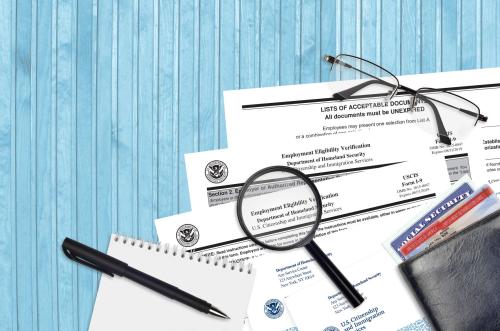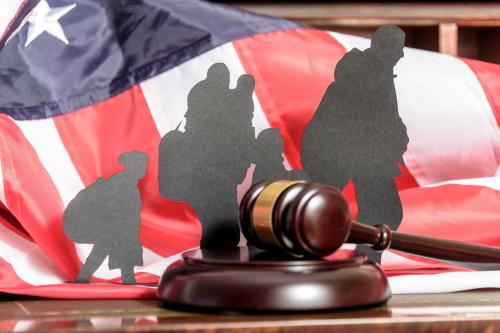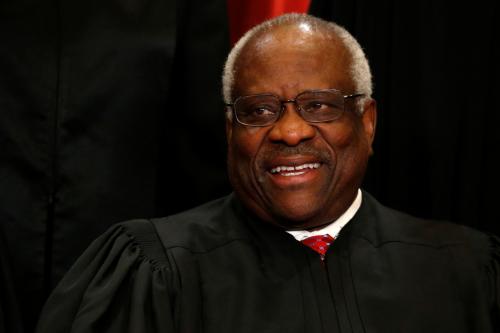Next week, the Supreme Court is set to hear arguments in Kirtsaeng v. John Wiley & Sons, Inc., a case that will have fundamental consequences for the global flow of books, music, movies, and other copyrighted material.
Foreign students studying in the U.S. have long known that textbooks can often be purchased much less expensively in their home countries. Supap Kirtsaeng, who originally came to the United States from Thailand as a student in 1997, built a business around this arbitrage opportunity, asking family members in Thailand to legally purchase textbooks and ship them to the United States, where he then resold them for a profit on sites such as eBay. In September 2008, publisher John Wiley & Sons, Inc. filed a complaint in a New York federal district court asserting, among other things, that Kirtsaeng’s actions constituted copyright infringement. A jury agreed, imposing damages of $75,000 for each infringed work. Kirtsaeng appealed to the Second Circuit, which affirmed the district court’s decision, and then to the Supreme Court, which will hear oral arguments on October 29.
Common sense would hold that a person who legally acquires copyrighted material such as a book or music CD generally has the right to resell it at a later time. And indeed, under the “first sale” doctrine, a person in possession of a copy of a work that was “lawfully made under this title” [Title 17 of the U.S. Code, which contains U.S. copyright law] “is entitled, without the authority of the copyright owner, to sell or otherwise dispose of” it. For instance, if you legally purchase a book or music CD, the owners of the associated copyrights can’t prevent you from later selling it at a garage sale or donating it to a library.
Or can they? If the product was manufactured and purchased overseas, the answer isn’t clear. The uncertainty arises due to the interpretation of the phrase “lawfully made under this title” and to a separate statute that prohibits the importation into the United States, “without the authority of the owner of copyright,” of copies of a work “acquired outside the United States.” Thus, a person who legally purchases a copyrighted work abroad and wants to resell it domestically can be caught between two ambiguous and potentially contradictory provisions of copyright law. Does the first sale doctrine provide the right to resell the work? Or is that right foreclosed because exercising it would of necessity involve a prohibited importation?
Unsurprisingly, the jurisprudence on this issue is complex and sometimes contradictory. In the 1998 Quality King decision, the Supreme Court considered hair care products bearing copyrighted labels that had been manufactured in the U.S., sold abroad and subsequently re-imported and sold without authorization in the U.S. The “whole point of the first sale doctrine,” wrote the Court in Quality King, “is that once the copyright owner places a copyrighted item in the stream of commerce by selling it, he has exhausted his exclusive statutory right to control its distribution.” But is that always true, or does it only hold when the item was manufactured in the United States?
In affirming the copyright infringement judgment against Kirtsaeng, the Second Circuit held in 2011 that “the first sale doctrine does not apply to copies manufactured outside of the United States.” Taken to its logical extreme, this interpretation could provide American companies that manufacture overseas with an extraordinary level of control over the secondary market for their products. The Third Circuit, by contrast, concluded [PDF] in a (pre-Quality King) 1988 ruling involving product label copyrights that “a first sale by the copyright owner extinguishes any later right to control importation of those copies.” Aspects of this tension in U.S. copyright law were also considered – though not fully resolved – by the Ninth Circuit in 1996 and 2008.
Kirtsaeng has attracted a large number of amicus briefs, with the American Library Association, Costco, eBay, Goodwill Industries International, Google, the National Association of Chain Drug Stores, and a group of leading American art museums backing Kirtsaeng. Costco, for example, writes [PDF] that the “first-sale doctrine plays an important role in Costco’s ability” to sell “genuine brand-name merchandise to its members at prices lower than its competitors,” and that Wiley’s position “that copies made abroad would have enjoyed significantly greater copyright protection than those made at home is inconceivable.” Goodwill argues [PDF] that the Second Circuit’s Kirtsaeng decision, if affirmed by the Supreme Court, could have “a catastrophic effect on the viability of the secondary market and, consequently, on Goodwill’s ability to provide needed community-based services.”
The American Bar Association, the American Intellectual Property Law Association (AIPLA), the Motion Picture Association of America (MPAA), and the Recording Industry Association of America (RIAA) have filed briefs supporting Wiley. The AIPLA argues [PDF] that Kirtsaeng infringed Wiley’s copyrights by the act of importing the textbooks, and that the first-sale defense regarding their subsequent sale is thus irrelevant. According to [PDF] the MPAA and RIAA, the motion picture and music industries “rely on the ability to divide rights across markets and to plan for and control the timing and manner of the release of their works in different markets around the world.”
One of the ironies of Kirtsaeng is that it involves shipping copyrighted works across an ocean in paper form, an approach more typical of the last century than the present one. While enormous amounts of copyrighted material still travels in shipping containers – think, for example, of the software included in consumer electronics products and automobiles – a growing fraction of written, audio, and audiovisual content is transported by fiber optic cable and stored in the cloud. The concepts of location and importation are thus more complex than in the past. And, with appropriate updating of copyright and licensing frameworks, cross-border flows of copyrighted material can be an opportunity for copyright owners, not a threat.
In the immediate term, however, the question is how to handle Kirtsaeng in the context of current American copyright law. Congress could not have anticipated all of the complexities of today’s copyright landscape when it enacted the Copyright Act of 1976. But it almost certainly wouldn’t have wanted the consequences that could arise if the Second Circuit’s Kirtsaeng decision is affirmed.



Commentary
Op-edCan Copyrighted Works Purchased Abroad Be Resold In the United States?
October 21, 2012